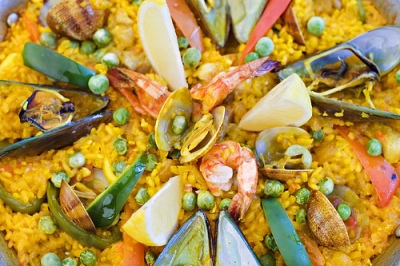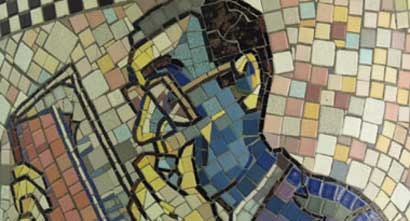La Biblioteca Digital Mundial
 La Biblioteca digital Mundial (BDM) surgió de una iniciativa propuesta a la UNESCO en 2005 por el bibliotecario del Congreso de los Estados Unidos James H. Billington. Se inauguró el 21 de abril de 2009 en la sede de la UNESCO de Paris. Se trata de una organización sin ánimo de lucro cuyo fin es el de difundir la cultura a través de Internet. Así, la BDM define su objetivos como:
La Biblioteca digital Mundial (BDM) surgió de una iniciativa propuesta a la UNESCO en 2005 por el bibliotecario del Congreso de los Estados Unidos James H. Billington. Se inauguró el 21 de abril de 2009 en la sede de la UNESCO de Paris. Se trata de una organización sin ánimo de lucro cuyo fin es el de difundir la cultura a través de Internet. Así, la BDM define su objetivos como:
Para alzanzar estos obejtivos, la BDM ofrece artículos digitales de alta calidad que reflejan la herencia cultural de todos los países miembros de la UNESCO.
Desde aquí os invitamos a que visitéis la BDM a través de la página: http://www.wdl.org/es/
Flamenco dance classes!
 Flamenco dance classes!
Flamenco dance classes!
Otoño 2010
Curso de sevillanas a cargo de Sandra Castell García dirigdo a todas aquellas personas interesadas tanto con como sin experiencia en el baile.
¿Cuándo puedo hacerlo y cuánto dura el curso?
Lunes de 18.30 a 20.30 hs. (15 de noviembre – 13 de diciembre). 5 semanas. 10 horas.
£105
Lugar:
Instituto Cervantes
102 Eaton Square. London. SW1W 9AN.
Tel.: 020 7235 0353 – cenlon@cervantes.es – www.londres.cervantes.es
– Para apuntarte en el curso contacta con el Instituto Cervantes:
E-mail: cenlon@cervantes.es
Teatro y Cuentacuentos
Queridos todos:
Desde aquí queremos agradecer a Maisa y a Javier su actuación en nuestro centro. Fue una actividad muy entrañable llena de movimiento, de sorpresas OH! y de risas.
Para todos los que os acercásteis a participar en la actividad del sábado 9 de octubre, os enviamos los mejores momentos en un vídeo.
Muchas gracias por vuestra asistencia. Esperamos que os hayáis divertido !
Os recordamos que el 13 de Noviembre habrá un Taller de Arte y Cuentacuentos a cargo de Lorena Carbajal y Montse Domínguez.
Os esperamos!
DRAMA course in Spanish
Este curso es una introducción a la Estructura Dramática y a los principales elementos que componen una obra teatral. Es una propuesta ideal tanto para quienes pretendan iniciarse en los principios del arte de la actuación, como para quienes necesiten un espacio creativo en su desarrollo personal y en la práctica de la lengua española.
¿Cuándo puedo hacerlo y cuánto dura el curso?
Miércoles de 18.30 a 21.30 hs. (06 de octubre – 17 de noviembre). 7 semanas. 21 horas.
¿Cuánto cuesta?
£205
¿Qué material vamos a usar?
El cuerpo y la voz. Algunos textos de autores latinoamericanos y españoles. Improvisaciones teatrales.
¿Por qué hacer este curso?
Porque la experiencia artística teatral es una posibilidad de enriquecimiento integral de la persona que permite desarrollar la expresión corporal, la sensibilidad, la imaginación, la comunicación y demás aspectos de la conducta sin la presión del trabajo escénico pero con el goce estético de la práctica artística.
Lugar:
Instituto Cervantes
102 Eaton Square. London. SW1W 9AN.
Tel.: 020 7235 0353 – cenlon@cervantes.es – www.londres.cervantes.es
Importante:
Es indispensable traer ropa cómoda para el trabajo corporal. También estar preparados para trabajar sin calzado.
– To enrol in the course contact the Instituto Cervantes:
E-mail: cenlon@cervantes.es
Tel.:02072350353
– For more information about the content of the course contact:
Germán D’Alessandro: Tel.: 078 5323 9028 / spanish.drama@gmail.com
A homage to Britain’s flamenco pioneers
PASSION and flamenco go together like pan con tomate, so it’s no surprise to hear producer-director Anna Holmes describe her film Spanish Steps: Flamenco in a Foreign Land as “a passion project”.
The making of this documentary has been a labour of love for the past 18 months or so after Anna was unable to secure funding from production companies. But thanks to a lifelong love of dance, plus the support of friends and family and her assistant producer Victor, Anna has succeeded in making her first film.
Her other reason for wanting to make this documentary was to capture a slice of social history before it’s too late – many of these flamenco pioneers are now in their 80s and sadly may not be with us for much longer.
London in the 1950s, what with post-war austerity and the notorious smog, must have been a pretty bleak place at times. But this was also an era of great social change, with many exciting, exotic new trends and tastes arriving from overseas.
El Colectivo Magazine Reading Group
El Colectivo Magazine Reading Group offers the opportunity to talk about and discuss Spanish literature, imitating the traditional Spanish tertulia.
The reading group meets one Friday per month at 6.30pm in the Instituto Cervantes; it is free to join and you are welcome to come along to any session.
In order to participate, there is only one requirement: to have read the scheduled book.
These are the titles and the dates for the last four months of 2010
Friday 17 September, 6.30pm
- El general en su laberinto by Gabriel García Márquez
Friday 15 October, 6.30pm
- Un milagro en equilibrio by Lucía Etxebarría
Friday 19 November, 6.30pm
- Abril rojo de Santiago Roncagliolo
Friday 10 December, 6.30pm
- Los informantes by Juan Gabriel Vásquez
In collaboration with El Colectivo Magazine.
For more information: grupo(at)elcolectivolondres.com
- Felix Bruzzone
- Juan Francisco Ferré
- Iosi Havilio
- Pola Oloixarac
- Sergio Olguin
How to make the perfect paella
 SPANISH cuisine has been very much a la moda for a while now, thanks in no small part to the iconic Ferran Adrià and El Bulli, plus a growing realisation among other cultures that tapas are a great way to eat.
SPANISH cuisine has been very much a la moda for a while now, thanks in no small part to the iconic Ferran Adrià and El Bulli, plus a growing realisation among other cultures that tapas are a great way to eat.
Attempting Adrià’s experimental recipes at home is beyond most of us, but a good paella is another matter – especially if you’ve had a lesson from the professionals.
London restaurant group PINCHITOtapas is running a masterclass at 10am this Sunday, July 25, at its branch in Bayley Street, WC1 (near Goodge Street and Tottenham Court Road tube stations).
Fifties flamenco on film
 FLAMENCO can be enjoyed in London most nights of the week, and is probably Spain’s most successful cultural export.
FLAMENCO can be enjoyed in London most nights of the week, and is probably Spain’s most successful cultural export.
Its popularity was shown once again this week when the Instituto Cervantes London was inundated with requests for places at a special preview screening of the film Spanish Steps: Flamenco in a Foreign Land.
This documentary pays homage to the pioneer flamencos who staged shows in London’s bars and restaurants from the 1950s onwards, paving the way for artists and aficionados alike to enjoy the thriving flamenco scene that is now so firmly established here.
These pioneers included both British amateurs and Spanish migrants escaping life under Franco, and many of the events were informal affairs, often in the basements of unglamorous Soho bars.
Nowadays flamenco is taken more seriously by London’s cultural establishment, with the annual festival at Sadler’s Wells and frequent events at other leading venues such as the Royal Albert Hall, as well as more informal concerts such as the monthly España on Fire at Ronnie’s Bar, upstairs at the famous Ronnie Scott’s. Then there’s restaurants including the well-known Costa Dorada in Hanway Street, the London Peña Flamenca . . .
On top of the world
 TRUMPETS, vuvuzelas and car horns blared long into the night, in between the songs of jubilation, as thousands of London’s Spanish residents and tourists celebrated their football team’s historic first World Cup by taking over the West End.
TRUMPETS, vuvuzelas and car horns blared long into the night, in between the songs of jubilation, as thousands of London’s Spanish residents and tourists celebrated their football team’s historic first World Cup by taking over the West End.
Even the policemen stood aside while the famous statue of Eros was scaled by hordes of flag-waving Spaniards, together with a pair of rival fans wearing incongruous orange shirts (Dutch courage?). No wonder the crowds at one point began chanting “Piccadilly, Español”.
The throng in the streets below Eros contained a good many Brits supporting Spain, plus, if the messages on El País from around the world are anything to go by, plenty of London’s Latin American community as well.
And it’s a pleasure to report that there wasn’t a single hint of trouble – the occasional encounter with wandering pockets of Dutch fans passed off amiably, and even though vast quantities of alcohol were drunk, there was no sign of drunkenness.
The reign of Spain
On Sunday, their footballers passed their way to glory. But when it comes to food, fashion and architecture – not to mention sun, sand and sea – the Spanish have long been world champions, says Simon Calder
Reclining male sculptures: The mesoamerican Chacmool
 ICLL Podcast series: New Episode (in English)
ICLL Podcast series: New Episode (in English)Lecture
One of the most distinctive types of Mesoamerican sculptures is that called Chacmool, representing reclining human figures holding vessels on the stomach. Chacmools have been found in Central and West Mexico as well as in the Maya region.
Elizabeth Baquedano has written several books and articles on the Aztecs, and curated an exhibition for Henry Moore’s Centenary at the University of East Anglia, Norwich. She is a lecturer at University College London, Institute of Archaeology and at the Institute for the Study of the Americas.






